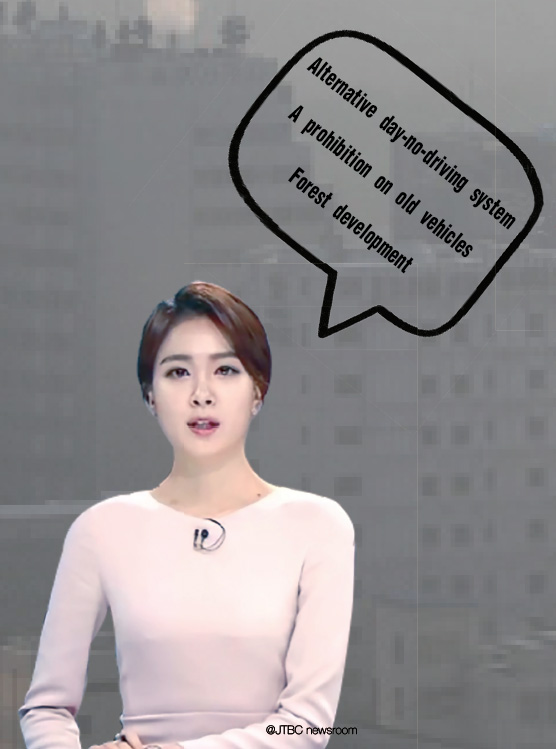
It is hard to see a clear sky nowadays in Korea, so people say, “lf you want to see a clear sky, you have to go abroad.” Fine dust suspended in the air causes respiratory problems, and some fine dust comes from China consistently. Therefore, this is no longer just an environmental problem but a social problem that threatens people’s right to live. What policies did the government take to reduce fine dust? First of all, actions to reduce fine dust, such as an alternating-day-of-no-driving system and a prohibition on old vehicles, were implemented, but the fine dust has shown no signs of decreasing despite the government’s actions.
People called on the government to take practical measures, and they want the Korean government to take a strong attitude towards the Chinese government. There is a lot of evidence that China is a big cause of fine dust in Korea. In the “Analysis of Airflow and Wind in a Bad Dust” by the Korea Meteorological Administration, the KMA said international influence makes up 40% of fine dust. The main culprits are China, North Korea, and a few other countries, but China is the biggest factor among them. Why does the South Korean government not show a strong attitude toward the Chinese government even though there is a lot of evidence that the cause of a substantial proportion of the fine dust is from China?
The concentration of fine dust and ultra-fine particles usually decreases when cold northwesterly winds blow and rises when warm westerly winds blow. Of course, when it rains, it can be reduced. However, fine dust spreads easily in winter when there is less rain, and Korea and China have a concentration of 60 to 90 percent of their total annual precipitation during the summer. According to statistics from the Ministry of the Environment, most of the causes of fine dust are fossil fuel use, such as oil and coal, and pollutants from automobile exhaust. When the wind blows, ordinary dust quickly subsides due to its heavy volume and weight. The dust is so small and light that it seriously affects neighboring countries. The scope of damage can be extensive, and the WHO has designated fine dust as a first-grade carcinogen. Therefore, the risk can be exacerbated over time.
As mentioned above, the government is operating an alternative-day-no-driving system, a prohibition of old vehicle operation, an urgent message system about refraining from going out and a forest development program. Despite such measures, fine dust has not been reduced, and people are suffering from fine dust. Moreover, text messages with loud sirens with loud sirens that stop people from going out make people angry.
Woo Su-min (’18, Dept. of Pre-medicine) said, “Last year, I didn’t realize the seriousness of fine dust. This year, however, I saw a cloudy sky covered with fine dust, and my throat was sore if I went out without wearing mask. Also, I was angry when I received an emergency disaster message encouraging me to refrain from going out, because the government failed to discuss the issue with China. I think sending text messages to notify people isn’t helpful at all. It is questionable whether the current domestic policy implemented by the government fundamentally reduces fine dust. Whether there will be a hard- line policy or negotiations with China, we hope the two countries will quickly resolve the fine dust problem. I hope the day when all CBNU students and all people will be able to breathe clean air will come as soon as possible.
In the meantime, satellite images of smog from China moving to the Korean Peninsula have been readily available. The Korea Institute of Standards and Science (KRISS) scientifically proved that pollutants originating from China were headed to Korea in March of last year, raising the PM2.5 concentration to a lousy level (PM2.5 refers to the size of fine dust particles).
Air Korea, a state-run Korea Environment Corp., made an announcement in 2019 and said it will show that China is the overwhelming cause of fine dust on the Korean Peninsula. From January to March of this year, the level of fine dust increased dramatically in the central and western regions due to the extreme cold. Various articles said that air pollutants had been introduced from outside the country, but most of them were from China. According to the report, a mighty wind was blowing from northern China, leading to a state of air suspension, which led to the accumulation of pollutants.
People always comment that an international lawsuit against China is necessary when they read news related to fine dust. The Korean government has set up many fine dust measures, but strangely, it is passive in responding to China. A petition to file an international lawsuit against China was created with much consent. The South Korean government also knows that China accounts for a high proportion of fine dust and that active measures are needed. To solve the problem through international lawsuits, the causal relationship must be clarified and scientifically verified. However, there is no data which can prove the causal relationship between Korea and China.
Yoon Seong-wook, a political science professor at CBNU, said, “Let’s say there is a river that runs through the three countries. What if the country in the middle ruins the river? The bottom line is that the country under the middle one will be polluted. Environmental issues are the same. Environmental issues are no longer unique to any country. China should recognize that fine dust from China affects China and its neighbors. China and Korea also believe that it is important for the two countries to create a diplomatic forum rather than pointing out the causes of fine dust. To avoid damage from fine dust from China in the future, there needs to be ways to reduce fine dust in Korea, but China’s fundamental methods of reducing fine dust are important. It is important for experts from both countries to work together to solve the problem of fine dust while sharing the methods used or planned in each country.”
In addition to the professor’s remarks, the fine dust policy being implemented by South Korea is a decision that thoroughly considers diplomatic relations between South Korea and China. A better solution could be for South Korea and China to work together on diplomatic activities before resorting to international lawsuits and hard-line policies. Based on this, the two countries would be able to find a viable and practical way together.
By Lee Dong-ah | da39@cbnu.ac.kr
By Nam Min-woo | mw38@cbnu.ac.kr


 All
All Feature
Feature






 Lee Dong-ah& Nam Min-woo
Lee Dong-ah& Nam Min-woo











